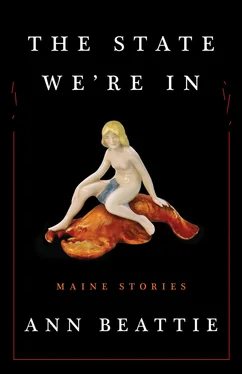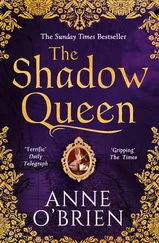They were almost to the house. Two people in a silvery blue Solara convertible passed by, and Trina gave them the thumbs-up. The world belonged to Trina. Which was better than it belonging to her uncle or Bettina. Her mother, of course, wasn’t even in the running. Her mother would be happy if her own life was a constant time-out — she wouldn’t consider such a thing punishment if she could sit in a chair and not speak and not move and, most of all, not check her phone. She loved turning it off. Then the bill collectors went to voice mail and her daughter couldn’t ask for anything and Raleigh wouldn’t always be checking up on her. Raleigh. She was very glad he was still in Maine, instead of California. He’d told her a story recently and sworn her to secrecy. It was that her father, back when he still wanted to impress his wife, sometimes came back from a fishing trip with lots of trout he hadn’t really caught. He’d bought them at the fish market. One time her mother had said, “Why are these so cold?” and he’d supposedly said to Jocelyn, “Remember this all your life, my little one. Your mother thinks that fish swim in warm water.”
Duff Moulton changed his nickname from Chip to Duff when the old block he was supposedly chipped from died at age 103. Mrs. Terhune, who had no nickname, and whose first name was rarely spoken, had supplied him with homemade soup and oyster crackers over the last few years, receiving a handsome check from Duff’s cousin at the beginning of each month for her efforts. She was seventy-four and quite able to continue making soup and doing everything else she was doing, thank you very much. She said this in response to a kindly phrased note that had come recently with one of the checks, Duff’s cousin politely inquiring whether — especially considering the very bad winter they’d endured — it was too much for her to go to Duff’s every day.
She understood that Chip was now to be called Duff, but he was eighty-two, and changing your name that late in life was ridiculous, so she either called him “my fine neighbor” or did not address him directly, relying on the Maine “ey-ah,” said rather loudly to let him know she’d entered his house.
It was big of her, she thought. Thirty-some years before, Chip’s brother had led her on, then married a young Portuguese woman and moved away to Providence. Such things had happened to many of her women friends, the most notable being her friend Rochelle Pennybaker, whose ex-husband wooed her back over several years, remarrying her with a justice of the peace presiding and their twin sons present. (One came from Arizona and was thrilled; the other — a psychology researcher at Harvard — begged his mother to reconsider and also told his father to join AA. He didn’t have much credibility, however, because he himself had been twice divorced.) Shortly after the honeymoon (heard this one before?) he did, indeed, join AA, where he took up with a transgender person — a lawyer, who managed to get the second marriage annulled. You don’t think things like this happen in woodsy Maine, off the beaten path? It sounds more like L.A.? In Maine, there may be a path, but it’s never clear, except perhaps to that great GPS programmer in the sky, and there are also significant numbers of beatings between husbands and wives, daughters and mothers, cousins and nephews — many of whom end up at the hospital ER, where I work. One came in last week with a Swiss Army knife sticking through his calf, bleeding profusely, in terrible pain, and all he could say over and over was that the person who stabbed him — who was standing right there, clutching his hand — was his cousin (female!).
Mrs. Terhune is a lady. I’ve rented her converted garage for the last six years or so, working on the novel I began in Iowa City, which I could summarize, but every day I live in fear that someone might have had the idea to publish a book on the same subject. To support myself, I work weekends as a sort of glorified janitor at the local hospital, and in the summertime at the local hardware store, which has a beautiful array of plants for sale. In winter I bartend three nights a week at one of the inns, which also assures me free cheese cubes. Mrs. Terhune is generous about giving me a container of soup or, when she makes it, because I really love it, tapioca. Inside my little house is a flat-screen, a Bose sound system (the outlet is in Kittery), and under grow lights, flourishing plants that would have otherwise died when they were unsold at the end of the season.
I began this story talking about Chip, now Duff. He’s a rather overwhelming presence because he has hearing problems and talks loudly, but also because of his height, six four, and a lifetime of overcompensating for a strawberry stain over his forehead that dips down across his eyebrow. People notice him coming — that is what he often says when he doesn’t know what else to say about some odd encounter he’s had on one of his trips about town. He drives only in daylight, and only if he feels rested and clearheaded. I’ve learned that with old people, you have to listen to all their rationalizations: they go over and over their I’m-safe-because-I-say-I-am routines.
For the last year or so, since my book is about two-thirds finished, I’ve sometimes read aloud to Mrs. Terhune. Let me just say that Shackleton figures in the plot, and that like many people I’ve been fascinated by the doomed expedition and writers’ various perspectives on it. It turned out that Mrs. Terhune had never heard of Shackleton or his expedition, and she became morbidly obsessed (as who isn’t). She’s probably heard fifty or sixty pages of the manuscript by now, and — this is so true of nonwriters — she always says that she can’t understand why my whole book isn’t about Shackleton. She can’t get enough of frozen toes and sacrificed dogs.
One night in March when it was still unusually cold she brought Duff along with her for reading night. I have electric baseboard heat (expensive!). Duff has a furnace that doesn’t work well; also, he’s a New Englander, and cheap, so he won’t turn up the thermostat. There the two of them were at my door, she with a jar of soup she’d made from tomatoes she’d canned, he just standing there, pretending to be chewing tobacco when he wasn’t, his big boots caked with mud and snow. I did ask him to leave them outside. He hung on to Mrs. Terhune and to me, though I proved more useful in bending down and unlacing the boots and pulling them off, with his hand that wasn’t on Mrs. Terhune’s shoulder clutching my door frame. I don’t even remember how I segued, that evening, from Shackleton to Bruce Chatwin’s In Patagonia —probably because of the quality of his prose, which I much admire — only to learn, at the end of my little reading, during which we all sipped herbal tea with honey, that Duff’s father had been to Patagonia. He’d also been to the Galápagos, and to the Suez Canal, where he’d gotten dengue fever. “He was no businessman, he was OSS, then CIA,” Duff announced. “You might wonder, well, what’s our business in the Galápagos? And the answer’s mine to give. The tortoises. At one time, believe it or not, our country considered rigging up tortoises to record conversation going on around them. Well, you might ask: how many bad guys were going to step outside to talk important business, like the Galápagos was just one big backyard? The answer was — at least if you got them to the Galápagos — quite a number! There was some ‘Go to the Galápagos’ campaign after World War Two. That’s where they wanted everybody to go, though most people preferred San Michael of Allende. You think about recent times and those boys, Nixon I think it was, trying to give Fidel Castro an exploding cigar. That’s no joke.”
Читать дальше












